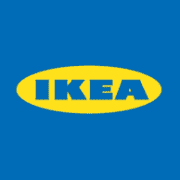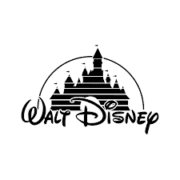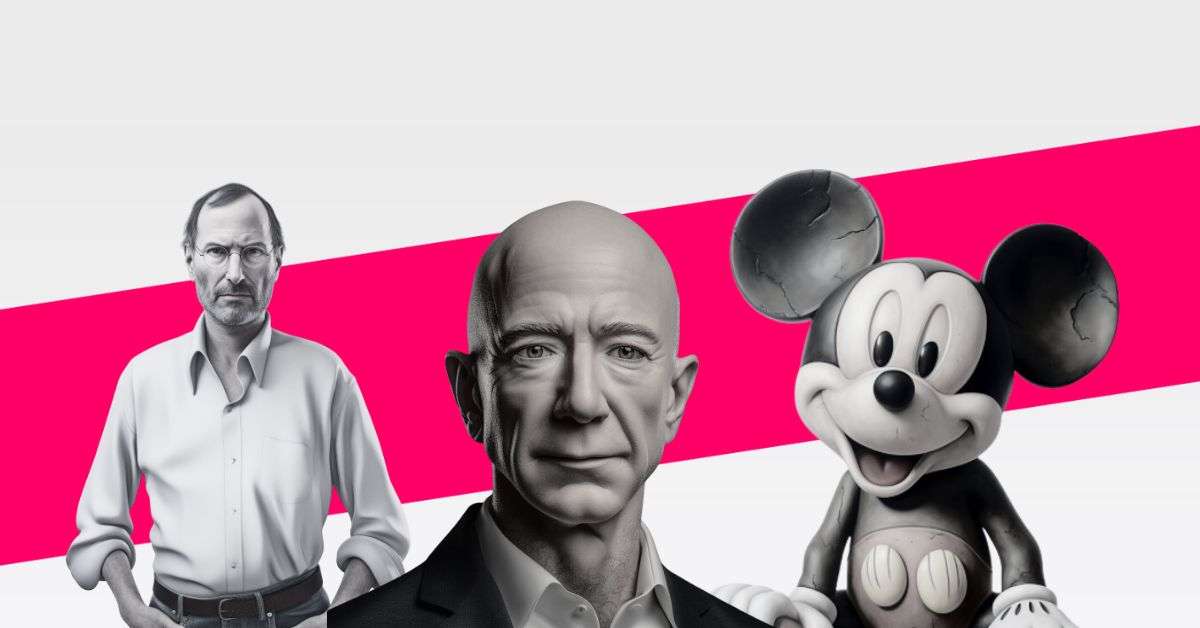Did you know that companies with strong corporate cultures are 35% more likely to outperform their competitors? This staggering statistic illustrates the undeniable impact of corporate culture on business success. Corporate culture isn’t just a buzzword; it’s the DNA of an organization, shaping everything from employee morale to customer experiences. Understanding why it matters is key to building thriving workplaces and profitable enterprises. We’ll look into some well-known corporate culture examples, and summarize the most important aspects for you!
In this article, we’ll delve into the captivating stories of global giants such as Google, Apple, and Amazon, as well as beloved brands like Disney. You’ll discover how their distinct corporate cultures have not only set them apart, but have also led to remarkable achievements. Let’s embark on a journey through these exceptional examples and gain insights that you can apply to your own workplace. Curious to learn more? Then check out our article all about the most prominent organizational culture models and their pros and cons.
The importance of Corporate Culture
Corporate culture, the heartbeat of any organization, goes far beyond office aesthetics or catchy mission statements. It’s the collective personality and values that define how a company operates, how its employees behave, and ultimately, its success. It influences everything from the way people collaborate to the company’s ability to innovate and adapt. For 46% of job seekers, culture is also an important aspect when considering a new job. We have discussed corporate culture in depth throughout our latest article: Organizational Corporate Culture: Basics and 6-Step Roadmap
1. Google: A Culture of Innovation
 At Google, the term ‘corporate culture’ is synonymous with innovation. This tech titan has cultivated a workplace atmosphere that thrives on creativity, openness, and flexibility. It’s an environment where employees are not just encouraged but expected to push the boundaries of what’s possible.
At Google, the term ‘corporate culture’ is synonymous with innovation. This tech titan has cultivated a workplace atmosphere that thrives on creativity, openness, and flexibility. It’s an environment where employees are not just encouraged but expected to push the boundaries of what’s possible.
Google’s company culture has several key benefits, such as fostering innovation by allowing employees to spend 20% of their time on personal projects, promoting a casual and collaborative work environment, and offering attractive perks like free meals and on-site fitness facilities. This culture has led to groundbreaking products like Gmail and Google Maps. However, it also has its downfalls, including the risk of overworking employees due to high expectations and the potential for intense competition among colleagues. Additionally, the company has faced criticism for its handling of diversity and inclusion issues, highlighting the need for improvement in creating a more inclusive workplace.
Main characteristics of Google’s corporate culture:
2. Porsche: A Legacy of Excellence
 When it comes to Porsche, their corporate culture embodies the very essence of precision, craftsmanship, and heritage. This German automaker has etched its legacy by preserving traditions and values that define the pinnacle of automotive excellence.
When it comes to Porsche, their corporate culture embodies the very essence of precision, craftsmanship, and heritage. This German automaker has etched its legacy by preserving traditions and values that define the pinnacle of automotive excellence.
Porsche’s company culture offers the benefit of a rich automotive heritage, with a strong focus on engineering excellence and a commitment to producing high-performance sports cars. This culture fosters a sense of pride and craftsmanship among employees, and it often results in top-notch, iconic vehicles. However, there can be drawbacks, such as the potential for a demanding work environment with high expectations for precision and quality, which might create stress for some employees. The emphasis on performance and tradition can sometimes lead to resistance when it comes to embracing new technologies and shifts in the automotive industry, which could hinder the company’s adaptation to future trends.
Main characteristics of Porsche’s corporate culture:
3. BMW: The Ultimate Driving Machine and Workplace
 In the world of BMW, the corporate culture mirrors the essence of their slogan, ‘The Ultimate Driving Machine.’ It’s a culture that places a premium on performance, luxury, and sustainability, much like their finely crafted vehicles.
In the world of BMW, the corporate culture mirrors the essence of their slogan, ‘The Ultimate Driving Machine.’ It’s a culture that places a premium on performance, luxury, and sustainability, much like their finely crafted vehicles.
BMW’s commitment to sustainability extends well beyond their cars. Their efforts to reduce carbon emissions and promote renewable energy are inspiring. Moreover, they invest heavily in employee development, offering programs like ‘Fastlane,’ which fosters career growth and continuous learning.
BMW’s company culture offers the benefit of a strong commitment to driving pleasure and quality, resulting in the creation of iconic luxury vehicles that car enthusiasts adore. This culture encourages innovation, with an emphasis on engineering excellence and a rich history of motor racing. However, it has its downfalls, like the potential for a competitive and high-pressure work environment, which can be stressful for some employees. Furthermore, BMW’s traditional approach may sometimes slow down the adoption of new technologies and sustainability initiatives in the rapidly changing automotive industry, raising the challenge of staying at the forefront of innovation.
Main characteristics of BMW’s corporate culture:
4. Ikea: Simplicity, Sustainability, and Swedish Charm
 Ikea’s corporate culture embodies the very essence of Swedish charm, and it’s built on three pillars: simplicity, sustainability, and democratic design. These values resonate in every facet of the company, from their product lines to their customer interactions.
Ikea’s corporate culture embodies the very essence of Swedish charm, and it’s built on three pillars: simplicity, sustainability, and democratic design. These values resonate in every facet of the company, from their product lines to their customer interactions.
Ikea’s commitment to sustainability is evident through their investments in renewable energy and their goal to become climate positive by 2030. Their democratic design approach ensures that beautiful and functional furniture is accessible to the masses. Plus, their focus on sustainable materials and recycling programs showcases their dedication to the environment.
Ikea’s company culture offers the benefit of making well-designed, affordable furniture and home products accessible to the masses, promoting a vision of functional and stylish living for all. This culture fosters creativity, sustainability, and cost-consciousness, making it a go-to choice for budget-conscious shoppers. However, it also has its downfalls, such as the potential for employees to feel the pressure of tight budgets and efficiency demands. Some have criticized Ikea for its complex assembly instructions and occasionally less durable products, which can lead to customer frustration. Additionally, the company has faced challenges related to labor practices in the past, highlighting the need for ongoing improvement in worker conditions and sustainability efforts.
Main characteristics of Ikea’s corporate culture:
5. Apple: Innovation and Design Excellence
 Apple’s corporate culture is a true embodiment of innovation, design, and an unwavering dedication to its customers. It’s a culture that values aesthetics, functionality, and the relentless pursuit of groundbreaking ideas.
Apple’s corporate culture is a true embodiment of innovation, design, and an unwavering dedication to its customers. It’s a culture that values aesthetics, functionality, and the relentless pursuit of groundbreaking ideas.
Apple’s company culture boasts the benefit of an unwavering focus on innovation, resulting in groundbreaking products that blend design and technology, creating a loyal fan base. This culture encourages a relentless pursuit of excellence, sleek product aesthetics, and user-friendly interfaces, which have set industry standards. However, it also has its downfalls, like the pressure to maintain secrecy and the risk of prioritizing style over substance at times, potentially leading to less repairable or upgradable devices. Critics have pointed out concerns about the company’s closed ecosystem and control over app distribution, sparking debates over competition and consumer choice. Additionally, labor conditions in Apple’s supply chain have faced scrutiny, highlighting the need for continued efforts to ensure ethical manufacturing practices.
Main characteristics of Apple’s corporate culture:
6. Amazon: Customer Obsession and Operational Excellence
 Amazon’s corporate culture is anchored in a dual commitment to customer-centricity and operational efficiency. It’s a culture that places the customer at the forefront of every decision, combined with a relentless pursuit of operational excellence.
Amazon’s corporate culture is anchored in a dual commitment to customer-centricity and operational efficiency. It’s a culture that places the customer at the forefront of every decision, combined with a relentless pursuit of operational excellence.
Amazon’s company culture offers the benefit of unparalleled convenience, extensive product selection, and fast delivery, which have reshaped the way we shop and transformed e-commerce. This culture prioritizes customer satisfaction and efficiency, often resulting in great customer experiences. However, it also has its downfalls, including concerns about employee working conditions and rigorous performance expectations in Amazon’s fulfillment centers, which have drawn criticism and calls for improved labor practices. Furthermore, the company’s market dominance and business practices have raised concerns about competition and antitrust issues, igniting debates about the balance between innovation and fair competition in the digital retail landscape.
Main characteristics of Amazon’s corporate culture:
7. Disney: Magic and Creativity
 Disney’s corporate culture is a unique blend of storytelling, creativity, and a touch of ‘magic.’ It’s a culture that transcends the boundaries of entertainment, emphasizing the art of storytelling, creative innovation, and the enchantment of shared experiences.
Disney’s corporate culture is a unique blend of storytelling, creativity, and a touch of ‘magic.’ It’s a culture that transcends the boundaries of entertainment, emphasizing the art of storytelling, creative innovation, and the enchantment of shared experiences.
Disney’s company culture provides the benefit of creating magical and timeless stories that have captured the hearts of generations, fostering a sense of wonder and nostalgia for both children and adults. This culture emphasizes creativity, storytelling, and family-friendly entertainment, resulting in beloved characters, theme parks, and media franchises that bring joy to millions worldwide. However, it also has its downfalls, such as concerns about the company’s historically traditional gender roles and limited diversity in its early character portrayals, reflecting a need for more inclusivity in its storytelling and workplace. Additionally, Disney’s vast media conglomerate status has prompted debates about its influence on content and media consolidation, raising questions about competition and creative diversity in the entertainment industry.
The main characteristics of Disney’s corporate culture:
8. Netflix: Freedom and Responsibility
 Netflix’s corporate culture is a distinct blend of freedom and responsibility, emphasizing employee autonomy and a results-oriented approach. It’s a culture that trusts its employees to make impactful decisions and values the outcomes over processes.
Netflix’s corporate culture is a distinct blend of freedom and responsibility, emphasizing employee autonomy and a results-oriented approach. It’s a culture that trusts its employees to make impactful decisions and values the outcomes over processes.
Netflix’s company culture boasts the benefit of revolutionizing the way we consume entertainment, offering a vast library of on-demand content that’s reshaped the television and film industry. This culture encourages creative freedom, allowing filmmakers and creators to experiment with unique and diverse storytelling, resulting in critically acclaimed original series and movies. However, it also has its downfalls, including the high-stakes nature of content creation and the potential for excessive work hours among employees in pursuit of continuous growth. As Netflix aims for global expansion, it faces challenges related to content localization and cultural sensitivities, highlighting the complexities of catering to diverse audiences while adhering to local regulations and values.
The main characteristics of Netflix’s corporate culture:
9. Salesforce: Ohana and Philanthropy
 Salesforce’s corporate culture is characterized by a unique ‘Ohana’ spirit, embracing a sense of family and belonging. Their commitment to philanthropy is deeply ingrained in their values, creating a culture that extends a helping hand to those in need.
Salesforce’s corporate culture is characterized by a unique ‘Ohana’ spirit, embracing a sense of family and belonging. Their commitment to philanthropy is deeply ingrained in their values, creating a culture that extends a helping hand to those in need.
Salesforce’s company culture offers the benefit of a strong commitment to customer relationship management and cloud computing, empowering businesses with powerful tools to connect with their clients and manage data efficiently. This culture encourages a sense of customer-centricity and innovation, often leading to the development of cutting-edge solutions that help companies thrive. However, it also has its downfalls, such as the pressure on employees to meet high sales targets and sometimes long working hours, which may impact work-life balance at work. Salesforce has also faced concerns about the environmental impact of its data centers and the need to further prioritize sustainability in its operations, reflecting a growing need for responsible business practices in the tech industry.
The main characteristics of Salesforce’s corporate culture:
10. Southwest Airlines: Love, Fun, and Low Fares
 Southwest Airlines’ corporate culture is a delightful fusion of employee dedication, humor, and an unwavering commitment to providing low-cost, high-quality air travel. It’s a culture that thrives on a sense of ‘LUV’ – the airline’s stock ticker symbol and embodiment of their love for both their employees and passengers.
Southwest Airlines’ corporate culture is a delightful fusion of employee dedication, humor, and an unwavering commitment to providing low-cost, high-quality air travel. It’s a culture that thrives on a sense of ‘LUV’ – the airline’s stock ticker symbol and embodiment of their love for both their employees and passengers.
Southwest Airlines’ company culture offers the benefit of a people-centric approach, fostering a friendly and cooperative atmosphere among employees, which translates to exceptional customer service and a fun, unique flying experience. This culture encourages a sense of camaraderie, job satisfaction, and a commitment to affordable air travel, making it a favorite among travelers. However, it also has its downfalls, such as potential challenges in maintaining employee morale during industry challenges like economic downturns and the ongoing COVID-19 pandemic, which has heavily impacted the airline industry. Additionally, Southwest’s one-size-fits-all seating and limited international routes may not fully cater to all passenger preferences and travel needs, underscoring the balance between company culture and diversifying services to meet various customer demands.
The main characteristics of South West Airlines’s corporate culture:
11. teamazing!
 Not to toot our own horn, but we believe our company culture is pretty amazing, too! It is grounded in a fundamental desire to excite teams and help companies all around the globe to work better together. As a young and motivated team, we thrive off of flat hierarchies, a positive error culture and the desire to give our best when we work. And not just for the paycheck, but because we genuinely enjoy what we do and are not just colleagues, but friends. It’s our mission to share our positive attitude with every team we work with.
Not to toot our own horn, but we believe our company culture is pretty amazing, too! It is grounded in a fundamental desire to excite teams and help companies all around the globe to work better together. As a young and motivated team, we thrive off of flat hierarchies, a positive error culture and the desire to give our best when we work. And not just for the paycheck, but because we genuinely enjoy what we do and are not just colleagues, but friends. It’s our mission to share our positive attitude with every team we work with.
Additionally, we at teamazing are really proud of the way we made our hybrid culture work. As we have colleagues from all over Austria as well as Germany, not everyone can come to the physical office. That’s why we designed our very own virtual office (or “Voffice”) via gather.town, which is a real game-changer for our collaboration, productivity and culture.




